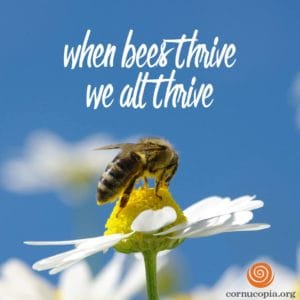 Bees and other wildlife are being ‘quietly poisoned’ by chemicals which are 5000 times more toxic than DDT, according to Professor Dave Goulson of the University of Sussex.
Bees and other wildlife are being ‘quietly poisoned’ by chemicals which are 5000 times more toxic than DDT, according to Professor Dave Goulson of the University of Sussex.
The Social Association’s annual conference established the case for continuing the ban on neonicotinoids, with Professor Goulson discussing saying the toxicity ‘takes your breath away.’
Goulson noted that studies on neonicotinoids have overwhelmingly found negative effects on bumblebee colonies and behaviour – and the very same chemicals which are killing bees are still readily available in any garden centre.
More research into the impacts and wider effects of neonicotinoids is necessary to prevent further damage to our on waterways and soils. Equally, the time has come for policy makers to take note of the chilling evidence that face our pollinators and the wildlife that inhabits the British countryside.
The Soil Association is keen for all farmers to work together to look at different ways of managing pests. The public have an important role to play too in protecting our bees, birds and soils – steps could include reducing the amount of common sprays used on back gardens to kill insects and buying insecticide-free organic food.
In addition to calls for an extension of the ban and more research on wider impacts of neonicotinoids, the conference, which was chaired by Farming Today’s Charlotte Smith, debated some of the biggest issues facing food and farming systems.
Delegates heard a presentation from Professor Carlo Leifert of Newcastle University, who spoke about ground-breaking research on the nutritional value of organic crops. Peter Bonfield, author of The Plan for Public Procurement, also discussed the English government food plan, Frank Strang of the Scottish Government spoke about the Scottish food plan and Mike Clarke of RSPB shared ideas on how a future government could fix our farming and food systems. Reducing use of antibiotics and improving animal welfare on farms were also key topics of discussion.
Speaking about the conference, Helen Browning, Soil Association Chief Executive said, “The topics covered at this year’s conference highlighted that tackling climate change, the most critical challenge of our time, could also deliver against the other big challenges we face, such as the huge issues in public health, the dramatic declines in biodiversity and depletion of resources like phosphate and soils. We must remember that there are many opportunities to make lives healthier and happier, while caring for nature too, and we must continue to work together to give government a mandate to provide joined up frameworks which will ensure people and businesses have the incentives to do the right things.”
The conference also included the presentation of the Soil Association 2014 Organic Awards, presented by Hardeep Singh Kohli. Award winners including Rohan Marley, son of Bob Marley and founder of Marley Coffee, and Ocado as best retailer. Awards were given for products in twelve categories, for the first time extending to new categories such as textiles and organic places to stay.
Following two rounds of very lively debate and voting from conference delegates, students from the SWARM Knowledge Hub, a project at Duchy College’s Rural Business School, were awarded the 2014 Soil Association Innovation award for ‘The Farm Crap App’, a mobile app which allows farmers to proactively plan nutrients applications and farm more profitably and sustainably.
The Innovation Awards, part of the Soil Association’s Duchy Originals Future Farming Programme, rewards excellence in innovative approaches to sustainable, low impact farming and growing.

